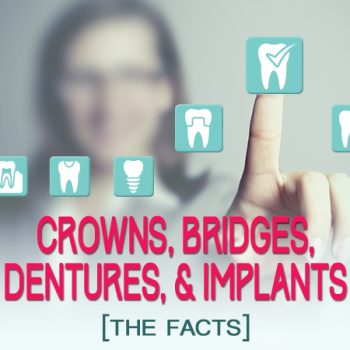Crowns, Bridges, Dentures & Implants: The Facts
 There are lots of ways to deal with missing or damaged teeth. You’ve probably heard one of us at Christopher Comer, DMD talking about implants, dentures, bridges, and crowns, but have you ever wondered what they are and how they work? Dr. Comer knows that folks like to be informed, so think of this as your guide to dental restorations that might end up in your mouth.
There are lots of ways to deal with missing or damaged teeth. You’ve probably heard one of us at Christopher Comer, DMD talking about implants, dentures, bridges, and crowns, but have you ever wondered what they are and how they work? Dr. Comer knows that folks like to be informed, so think of this as your guide to dental restorations that might end up in your mouth.
Crowns, Bridges & Dentures, Oh My!
At some point in time, most of us will lose at least one adult tooth. The most common cause of tooth loss is gum disease, but it could also be an accident, a sports injury, or a cavity. Some people are even born without the ability to develop one or more adult teeth! Either way, the point is that most Savannah residents will one day face a decision: how do I replace my lost or damaged tooth? There are many ways to fill a gap in your bite:
Crowns
Crowns themselves do not replace entire teeth, but they play an important role in the process of stabilizing teeth and supporting other devices that restore harmony to your bite. Sometimes, Dr. Comer will place a crown on a patient’s tooth to improve its appearance or strengthen it after a cavity has left the tooth unable to support a filling.
Placed directly over the surface of the tooth (like a king’s crown), crowns can also be used to protect weak teeth, repair broken teeth, attach and anchor a bridge, and/or cover an implant. They come in a variety of materials and colors to suit several different needs.
Bridges
Bridges are permanent or removable dental restoration appliances that replace missing teeth with artificial teeth. By creating a literal bridge between gaps, bridges improve the functionality of your bite and the beauty of your smile.
Bridges can be made of gold, alloys, porcelain, or any combination thereof. Both fixed and removable bridges make use of surrounding teeth for support, but fixed bridges are usually more stable than removable bridges. However, they are also more expensive than removable bridges.
Dentures
If you have lost most or all of your teeth, dentures may be the way to go. Dentures are natural-looking, removable appliances that allow you to eat and speak normally, despite a lack of teeth. They also help prevent sagging of the facial muscles, which can occur if there are little or no teeth to support the structure of your face.
There are three types of dentures: conventional, immediate, and overdentures. Conventional dentures require the removal of any remaining teeth and a healing period (sometimes several months or longer) before they can be fitted. Immediate dentures also require the removal of your remaining teeth but are inserted on the same day as the removal.
Overdentures are a great option if you have a few healthy teeth left. They are called overdentures because Dr. Comer fits them over your remaining teeth, which provides support and helps keep your jawbone healthy. Although the process of adapting to your dentures may be uncomfortable at first, having functional teeth is much better for your health in the long run!
Dental Implants
In terms of preserving the integrity of the jawbone and providing support and strength to nearby crowns, bridges, and/or dentures, dental implants are the best option for missing teeth. Implants are small, titanium posts that are inserted directly into your jawbone. The bone grows around them, much like a natural root, and fixes them in place.
Once the bone around the implant is fully healed, a replacement tooth is placed over the implant. This is the closest you can come to a natural tooth. Stimulation from chewing with an implant helps to preserve the jawbone and encourage circulation in the surrounding area. Implants are a permanent solution for a healthier smile.
Why Fix Missing Teeth?
Even if missing teeth aren’t visible and don’t seem to affect your bite, it is still important to do something about them. The reasons for using crowns, bridges, dentures, and implants go beyond cosmetics and comfort. Your adult teeth are designed to work as a team, and any missing player can compromise the function of your bite, ease of speech, susceptibility to dental disease, and the health of your jawbone.
The content of this blog is not intended to be a substitute for professional medical advice, diagnosis, or treatment. Always seek the advice of qualified health providers with questions you may have regarding medical conditions.









